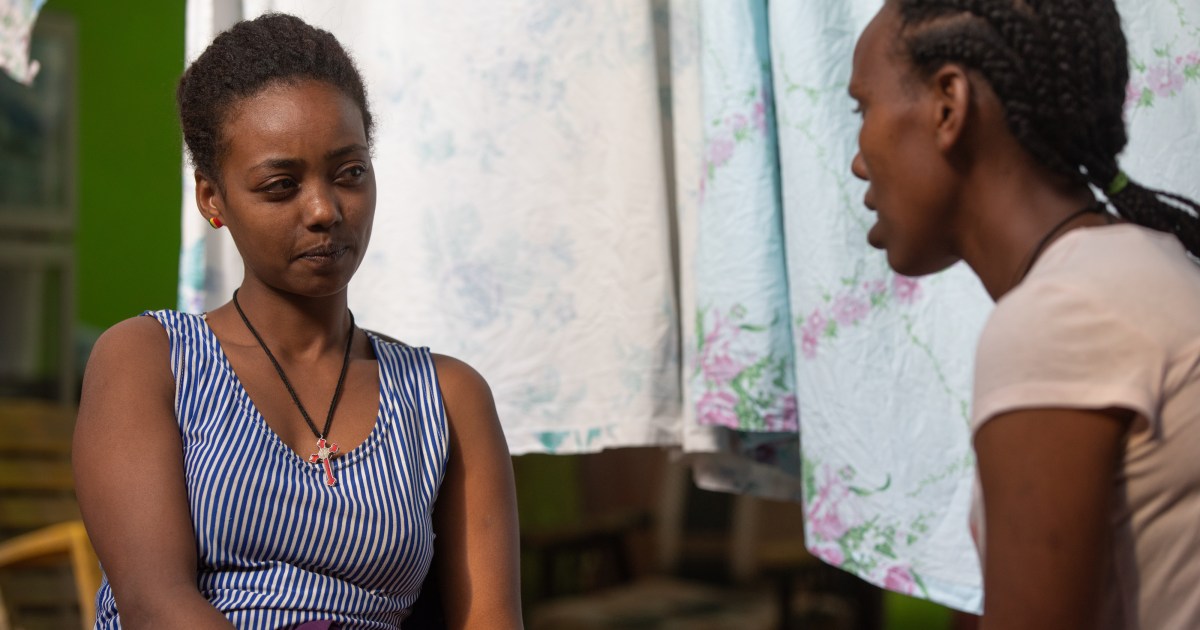?She just vanished?: Ethiopian domestic workers abused in Lebanon
Companies, agencies, institutions, etc
Reuters
Amnesty International’s
Al Jazeera
monster.”Eventually
Emebet
Meseret Hailu
Foreign Ministry
Meseret’s
Al Jazeera’s
self.“She
Oula
the Oromia region’s Guna district
Labour Ministry
employers’
Chewanesh
People
Aster Goshu
Diala Haidar
Meskerem Amare
Chewanesh Mariye
Amare Asfaw
Tsedale
Nahla Mohsen
Zecharias Zelalem
sentence.”Emebet Alemu
Meseret
Dipendra Uprety
Priya Subedi
Joseph Eid/AFP]“Since
Halima Ubpah
Patricia
Saadeh
Facebook
Zacharias Abubeker
Al Jazeera]According
Martha Tadesse
Al Jazeera]After
Tsedale Amare
Al Jazeera]Chewanesh Mariye
Michel
Oula Keyrouz
Michel Keyrouz
Mohamed Azakir
Aster home.“We
Aster/handout]Aster
Legna Besidet
Marlene Atallah
Mohamed Azakir]Worse
Faustina Tay
going.”Faustina Tay’s
death.‘Pay
Piang Ngaih Don
Groups
Ethiopians
Lebanese
Filipina
Ghanaian
English
Physical locations
the Middle East
Middle Eastern
Al Jazeera]Chewanesh
Emebet
Jounieh
Lebanon.“Pay
Places
No matching tags
Locations
Lebanon
Addis Ababa
Ethiopia
Beirut
Saudi Arabia
Kuwait
Meskerem
Dera
Canada
Nepal
Uprety
Subedi
Hazmiyeh
Egna
Events
No matching tags

Summary
“I’ve cried so much that I have trouble seeing things from a distance.”It was late 2019, and the then-24-year-old Ethiopian woman had waited for her employers to leave their home for work in Beirut, Lebanon, before hitting record.“I went four years without hearing from my parents,” Aster says into the camera.“My employers say, ‘you Ethiopians will always be poor, what difference would it make?’” she adds, explaining that she’s only received a salary for three months of the four years she is owed. Ethiopian traffickers are known to have charged up to $500 to facilitate the travel of recruits to Lebanon, where domestic workers make on average $150 a month.In a photo from 2015, an Ethiopian migrant domestic worker holds up a placard during a parade in Beirut, to support the rights of migrant domestic workers in Lebanon [File:Reuters/Alia Haju]Some Lebanese employers force their domestic workers to put in extremely long hours, deny them days off, withhold pay, confiscate their passports to prevent them from leaving, and severely restrict their movement and communication, according to Diala Haidar, Amnesty International’s Lebanon campaigner.“In extreme cases of exploitation, we’ve documented forced labour and human trafficking as well,” Haidar told Al Jazeera.Following reports of abuse, Ethiopia, in 2008, banned its citizens from travelling to Lebanon for work. Employment records reviewed by Al Jazeera showed that Mohsen agreed to not only pay Meskerem’s $150 monthly salary, but also purchase her air ticket home to Ethiopia, as is custom upon the expiry of a worker’s two-year contract.Months went by, however, and Meskerem never received her salary.“I kept asking ‘when are you going to pay my sister?’ She would say that after six months, Meskerem would receive the accumulated pay,” Tsedale told Al Jazeera by phone from Beirut.In March of 2015, with Meskerem yet to see a penny for more than two years of work, an exasperated Tsedale reached an agreement with her sister’s employer: Meskerem would be paid by the end of the month or she’d be permitted to leave. When Al Jazeera visited Emebet’s home in September 2019, she had not seen her daughter in eight years.Meseret Hailu during her childhood [Photo courtesy of Zecharias Zelalem/Family handout]Meseret started working for a Lebanese family as a domestic worker shortly after arriving in the city of Jounieh in February 2011. According to This is Lebanon, Ubpah was confined without pay in the home of a family with close connections to Lebanon’s political elite for 10 years.“It might be less than conventional, but it’s effective,” said Patricia, a This is Lebanon caseworker who uses a pseudonym for safety reasons.“Oftentimes, it’s their reputations and not their consciences that pushes abusers to act,” Patricia told Al Jazeera, adding that the group has helped free hundreds since 2017.This is Lebanon caseworkers studied the files of both Meskerem and Meseret for most of 2019. A few weeks after Al Jazeera visited the Emebet’s home, the group called Meseret’s Lebanese employer, Dr May Saadeh, a single mother of three daughters.This is Lebanon activists told Saadeh they would post Meseret’s story to the group’s Facebook page if she did not release the Ethiopian woman.Saadeh gave Meseret some cash and booked her a flight back to Ethiopia. By September 2019, Meseret arrived back home.Emebet Alemu after being reunited with her daughter Meseret, in May 2020 [Photo courtesy of Zecharias Zelalem/Family handout]“I was confused and couldn’t believe it,” a freed Meseret told Al Jazeera, weeks after arriving in Ethiopia. Emaciated, drained, Meskerem had also lost most of her teeth.Home again: Meskerem Amare in Addis Ababa September 2020 [Martha Tadesse/Al Jazeera]After months of recuperating, Meskerem gradually opened up about her time in Lebanon, and spoke of the physical and mental abuse endured, the lack of food and how she was locked in at all times and forbidden contact with the outside world.“She was cruel,” Meskerem said of her employer.Meskerem remained reluctant to go into detail about what caused her to lose most of her teeth. We both couldn’t believe we were going to see each other alive.”A year later, Chewanesh Mariye is reunited with her daughters Tsedale Amare and Meskerem Amare, September 2020 [Martha Tadesse/Al Jazeera]Chewanesh Mariye spilled tears of joy, but also sadness when she first laid eyes on her daughter who was a shell of her former self.“She had aged considerably and was so frail-looking,” she said. She will take all of it when she returns to her country one day.”When asked when that might be, Oula Keyrouz said that “because of the dollar crisis in Lebanon,” the family couldn’t afford to send Aster home.“We will wait for things to improve,” she told Al Jazeera at the time.Not long after Al Jazeera and This is Lebanon first contacted the Keyrouz family, Aster was given a phone and permitted to contact her family for the first time in more than four years.In March 2020, Oula Keyrouz told Al Jazeera that the family would not release Aster because they feared that doing so during a coronavirus pandemic would “endanger her”. She was dropped outside the Ethiopian consulate, where members of a community group who had called the taxi, paid the fare and took her in.“It was like being freed from prison,” Aster later said.Aster’s final selfie taken at the home of the Keyrouz family in Lebanon, hours before her escape on June 17, 2020 [Photo courtesy of Aster/handout]Aster was part of a group of 90 Ethiopian domestic workers who were repatriated in September, with the help of Egna Legna Besidet, a Beirut-based nonprofit organisation.Aster successfully escaped the Keyrouz home, but like Meseret and Meskerem, she returned from Lebanon empty-handed after years of toiling without pay. We have also begun giving orientation sessions for domestic workers to learn how to bring their cases to Lebanese courts.”But Lebanese courts have rarely sentenced abusive employers to jail time, and any kind of justice is often out of reach for migrant workers.“If there was any justice, I wouldn’t have been jailed for a single day,” Meskerem said.Ethiopian domestic workers wearing masks sit together with their belongings in front of the Ethiopian consulate in Hazmiyeh, Lebanon, June 8, 2020 [File:Reuters/Mohamed Azakir]Worse still, is that authorities estimate that at least two domestic workers die weekly on average.
As said here by Zecharias Zelalem